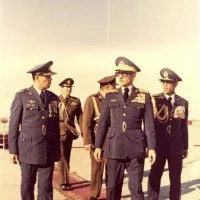A council of combined security forces known as the Derg staged a coup d’état on September 12, 1974 against Ethiopian Emperor Haile Selassie I, arresting and imprisoning the monarch who had ruled for decades. The committee renamed itself the Provisional Military Administrative Council, took control of the government, soon abolished the monarchy and established Marxism-Leninism… Read More "Anatomy of an Overthrow: How an African Leader was Toppled"
Kleptocracy and Anti-Communism: When Mobutu Ruled Zaire
Born to a modest family, Joseph-Desiré Mobutu prospered in the Force Publique, the army of the Belgian Congo. Mobutu became army chief of staff following a coup against Patrice Lumumba, and after a second coup on November 25, 1965 assumed power as military dictator and president. He changed the Congo’s name to the Republic of… Read More "Kleptocracy and Anti-Communism: When Mobutu Ruled Zaire"
Igniting Iraq’s Invasion of Kuwait – Loans, Land, Oil and Access
Iraq invaded Kuwait on August 2, 1990 largely for economic reasons, but the contiguous Gulf countries had long-standing territorial conflicts as well. The decision to attack was based on the need to erase Iraq’s massive debt: Iraq had largely financed its 1980-1988 war with Iran through loans and owed some $37 billion to Gulf creditors… Read More "Igniting Iraq’s Invasion of Kuwait – Loans, Land, Oil and Access"
Kyrgyzstan After Independence – An Unfulfilled Promise
After the collapse of the USSR, Kyrgyzstan, despite its isolation and lack of development, was considered to be one of the more promising newly independent states, “the Switzerland of Central Asia” with its mountains, pragmatic president, and relative lack of ethnic tensions or repression. The U.S. and others poured in aid to help establish free… Read More "Kyrgyzstan After Independence – An Unfulfilled Promise"
Resolving the Czechoslovak Gold Dispute
As the Third Reich annexed the Sudetenland and Poland and the German war machine pushed through the Eastern Front towards the Soviet Union, millions were left dead, cities were reduced to rubble, and Europe was left destitute and desperate to rebuild. In addition to the immense loss of human life, the Nazis also stole countless… Read More "Resolving the Czechoslovak Gold Dispute"
Mohammad Reza Pahlavi, the Shah of Iran, departed Tehran on January 16, 1979 to seek medical treatment and to escape growing political unrest in the country he ruled. The Shah had consolidated his hold on power after the 1953 U.S.-backed overthrow of Mohammad Mossadegh and was considered a vital ally to the U.S., a leader… Read More "Finale of the Persian Monarchy and Prelude to the Iranian Revolution"
Hong Kong Returns to China, Part II
As the formal handover of Hong Kong to China approached, many grew concerned about Beijing’s intentions. Tens of thousands of Hong Kong citizens emigrated in the late 1980s and early 1990s for places like the UK and Vancouver while several came to the U.S. consulate in Hong Kong with claims of American citizenship. The event… Read More "Hong Kong Returns to China, Part II"
Evolution of the European Union: Early Seeds of Dissolution?
Britain has always been a part of Europe and yet at the same time, it has seen itself as distinct from the rest of the continent — the English Channel has often proven to be more than just a geographic barrier. However, in the shadow of World War II, as the continent realized the need for greater… Read More "Evolution of the European Union: Early Seeds of Dissolution?"
How Did We Get Here? A Look Back at the Creation of the European Union
Welcome to Part I of our crash course on the formation of the European Union (EU). Each treaty signed between 1948 and 2007 brought Europe one step closer to today’s EU. Back in the aftermath of World War II, a group of European countries decided that the Dunkirk Treaty of 1947, which the UK and France… Read More "How Did We Get Here? A Look Back at the Creation of the European Union"
We Don’t Give a Dam — The Feud Over Financing the Aswan High Dam
Egypt’s agriculture has always depended on the water of the Nile; the river’s perennial floods, while critical in replenishing the fertile soil, constantly threatened to wash away a season’s harvest. The Aswan High Dam was built to regulate the river’s flooding as well as to create hydroelectric power and a reservoir for irrigation. Its planning… Read More "We Don’t Give a Dam — The Feud Over Financing the Aswan High Dam"

